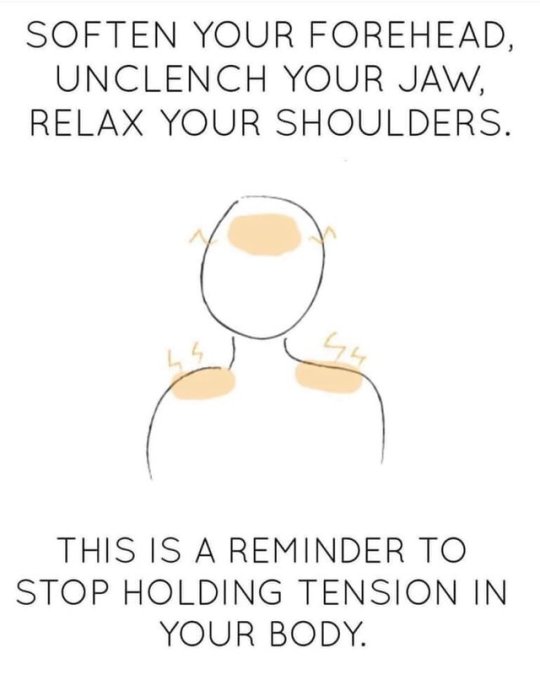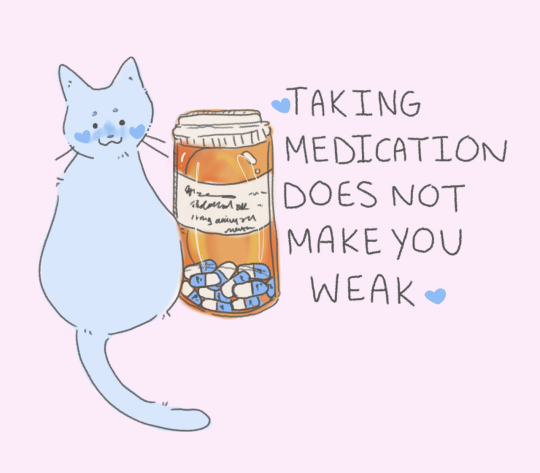E. he/they, OSFED, PTSD, Schizophrenia, and more. This is my mental health blog. Some content may be triggering.
Don't wanna be here? Send us removal request.
Text
Apps for mental health
(With descriptions from the Play Store)
STOPP * Use this app if you want to start to stop the vicious cycles of depression and anxiety, and other negative and repetitive behaviours.
eQuoo A choose-your-own-adventure game that increases your emotional fitness and teaches you new psychological skills, helping you level up in real life.
Calm Harm Calm Harm provides tasks to help you resist or manage the urge to self-harm. Get started by setting your password so that it’s completely private. You can personalise it if you wish, by choosing the background colour theme and deciding on whether you would like some company using a variety of friendly characters.
Alarmy - the world’s most annoying alarm * With Alarmy you can wake up to five different missions. Different snooze options help you wake up slowly and gradually. No more oversleep, wake up easily, and be refreshed with various alarm ringtones and stylish clocks. Made by heavy sleepers for heavy sleepers.
Habitica * Treat your life like a game to stay motivated and organized! Habitica makes it simple to have fun while accomplishing goals. An RPG style app that helps you get into good habits, break bad ones and accomplish tasks to gain XP.
Stay Focused - App Block & Website Block A Self Control, Productivity and App Usage tracker app.
Smiling Mind Smiling Mind is a unique web and app-based program developed by psychologists and educators to help bring balance to people’s lives.
Apps with * by the name have been tried by me, others I have found recommended by various sources. These should all come free, but you can check specific details in the app store of your choice. Please note the links are for Google Play users, but I believe these are all available also on the App store!
If you can recommend any app you found particularly helpful for yourself, please feel free to do so in a reblog. :)
972 notes
·
View notes
Text
Tips to disarm Delusions
Let’s get personal. Sometimes I have delusions that my Tumblr feed is sending me messages from a cosmic source. Sometimes I have delusions that my Spotify’s Discover Weekly playlist is sending me messages. Last week I freaked out because half the songs in my DW playlist were about water or fire or some sort of element. Idk why that matters but believe me, at the time it felt IMPORTANT. These are Delusions of Reference, meaning that at the time I feel like the Universe is sending a special message just for me. But I’ve been getting way better at logic-ing myself out when those sources start to trigger me too much and I would like to share.
1. Touch something- Physically ground yourself. This can do wonders if you’re having really abstract delusions. It connects you to the physical world and encourages you to connect with reality.
2. Think in terms of probability- Out of the millions of people who use Spotify, why would there be anything groundbreaking about my playlist alone? If I follow a Tumblr blog, why would they blog things specifically meaningful to me? People blog things that they like. I might connect with a blog’s content because I have things in common with the blog’s creator.
3. Say your delusions out loud- Sometimes vocally saying, “Right now I’m experiencing psychosis and I believe that a cosmic force is telling me I should spend more time outside because several songs on my playlist had the words “Mountain” or “River” in them.” It sounds stupid when you say it out loud. That’s the point.
4. Contact a friend- One of my friends is the most logical and grounded person I know. Sometimes I talk to her when I feel psychotic and she immediately sets me straight and says “There’s no fucking way people would blog things specifically for you.” And I’m immediately like, “You are so right. Thanks bitch.” This is why a good support network is so important.
5. Turn off the trigger- Instead of listening to the playlist that has trigger words in it, I switch to a Calming Piano playlist. I still get to listen to music but I am not burdened by the lyrics when I’m in a sensitive state.
6. You aren’t Special- If I see a Chris Hemsworth gif that feels eerily similar to a conversation I just had, I say “You aren’t the only person on Earth who has a crush on Chris Hemsworth.” If I’m listening to my Discover Weekly playlist and feeling emotional about someone and a love song comes on, that’s because love songs are common. Half of music is love songs if you count it all up. Your emotions and interests are not nearly as specific as you think they are.
7. Just go to Bed- If the night is already ruined, just slap your hand on the reset button. Seriously, sometimes just going to bed is better than staying up and letting yourself be tormented.
8. Remember the Sensations of Psychosis- For me that means feeling far away and out of my body. It also means feeling like my face is numb and tingling. Beyond that it feels like my ears are turned off and my pulse increases. When I get that creepy fluid psychotic sensation I think, “Well fuck this is Psychosis.”
9. Don’t Drink or do Drugs- This sounds like it’s obvious, but if you don’t realize you’re psychotic, it’s easy to make mistakes. The goal is to ground yourself, realize that what you’re feeling isn’t logical, and place your consciousness back inside your body. Mind altering substances will cause a bad trip.
10. Count things- It might sound dumb but it’s a good grounding technique to say something like, “There are four windows in this room, one cat, one computer, and one person. There is nobody here talking to me. I am alone in this room.” It can also help distract yourself from the delusional thoughts if you feel unable to pull yourself back into your body. “There are 12 magazines on the table, four legs on the table, eight succulent plants…”
11. Use real time Physical Sensations- Notice the way your body feels. Notice the way you are rhythmically breathing. Notice the discomfort of your ass sitting in a weird position. Squeeze your arm. Notice how it feels painful. Your body is alive and you are living in it.
People might judge you for being psychotic because they don’t understand psychosis. But I feel like it’s better to talk about this stuff versus acting ashamed or like it makes you crazy. Who cares if you’re crazy anyway? If you were crazy and you still managed to live a normal life, who really cares? And yes, I’m already on antipsychotics. They don’t prevent everything.
3K notes
·
View notes
Text
Mental Health Apps
After being asked a couple times about useful apps for the brains, I decided to round up a handful to share! Especially look at My 3!
Note: All these apps are FREE bc f*ck capitalism, although a lot of them have paid versions with more content. They’re all available on iPhones bc that’s all I have to test on so I’m not sure how many are Android-capable I’m sorry!
Mood Tracking/Diary
Daylio

I use this one every day and I have for over 500 days (it counts). It lets me track my moods twice a day and pair it with different activities or conditions that I can customize. I can look back at the charts and see patterns in my moods, which has been really helpful.
Spot On
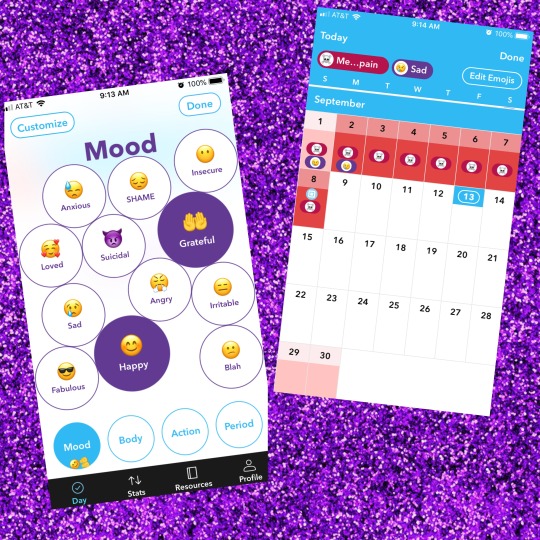
This one is really good for people whose moods fluctuate with their hormones. I use this one to track that so I know when to expect changes. It also lets you track activities. And it’s created by Planned Parenthood!
Cognitive Behavioral Therapy
What’s Up

What’s Up has a lottttt of good info in it. It has basic tracking capabilities of positive and negative habits as well as a basic text diary you can keep. None of it is behind a paywall so you can access information on anxiety and depression as well as coping techniques for both. Don’t get confused like I did- you can swipe to access more pages. This app has a lot of reading tho, so be aware of your own preferences.
CBT Thought Diary

CBT Thought Diary is a good one for fighting negative thoughts. You can record a variety of moods, gratitude journal, and use CBT skills to contradict your neg thoughts. You can’t really do much more than that, but not all apps need to have all the bells and whistles.
Woebot

My sister uses this one. It’s got a cute little robot that talks to you daily to check in and teaches you CBT tools. It shows you cute little educational videos too. Your interaction can be as little as a check in, or you can seek guidance on specific issues you’re having. It requires a lil small talk but it’s good if you want a little more TLC than just reading a webpage.
Dialectical Behavior Therapy
DBT Coach

A fair amount of DBT Coach is behind a paywall BUT I love the diary card function bc it looks good and it covers all the bases. It’s got mood, skills, activities, journal, urges, emotions, sleep, and a question about medication. You can even add photos to your journal! You have to explore the lessons and exercises to find those which are free but what’s there are p decent.
DBT Travel Guide
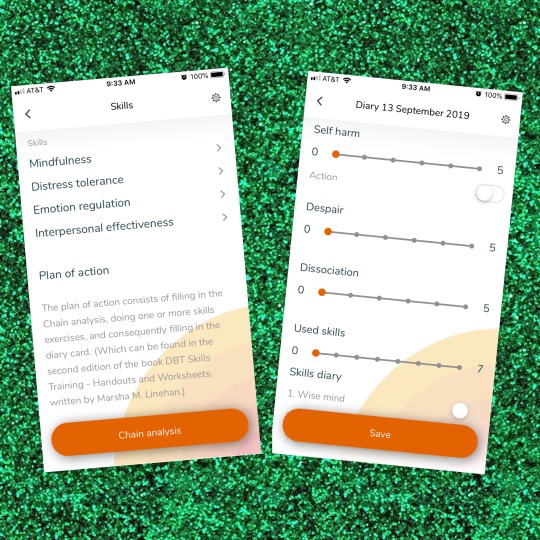
DBT Travel Guide has basically all the DBT info for free (bless!). It’s got a diary card, a tab for your therapy or other agreements, techniques specifically tailored to certain crises, information on skills, AND audio exercises! This is definitely the most comprehensive DBT app I’ve found.
Eating Disorder Recovery
Rise Up + Recover
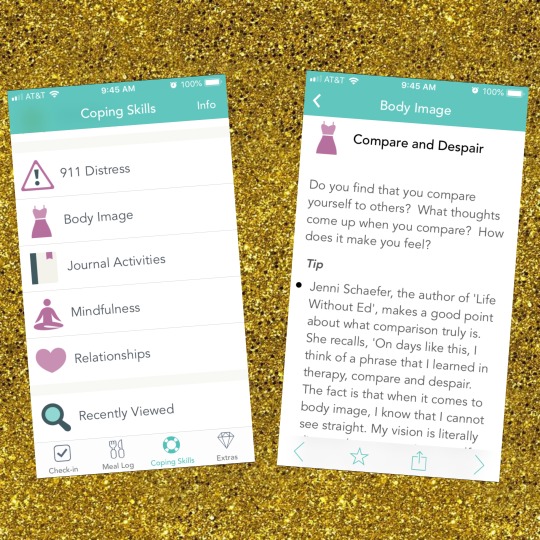
Rise Up + Recover is an app for those with disordered eating created by the org Recovery Warriors. It’s an entirely free app that lets you log meals, work on body image, do other crisis and self-improvement exercises AND it lets you send that info to your therapist or whomever. It can link you to RW playlists, podcasts, and even help you find local treatment.
Recovery Record

RR is an app I used during my first bout in recovery years ago that I liked bc it gave me lil rewards for logging my meals- like these puzzle pieces. It’s grown a lot since then and includes symptom tracking & questionnaires, the ability to ‘like’ the cute or inspirational images they reward you with so you can revisit, meditations, and a heart rate monitor for apple watches. Like Rise Up, you can share it all with your treatment team.
Crisis Intervention
Calm Harm
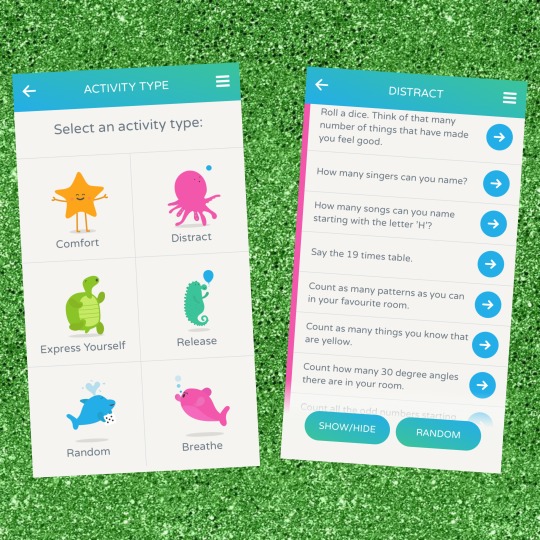
There’s a great post going around with more info on Calm Harm but it’s a really cute and helpful app to use when you want to self-harm. It provides various activities in each category to do for either 5 or 15 minutes as you urge surf.
ShinyThing
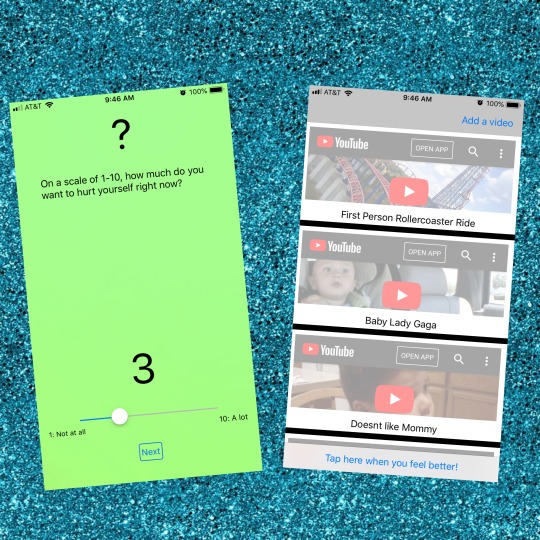
ShinyThing is much the same but offers you YouTube videos instead. You can even add your own faves to distract you next time. It tracks your urge level before and after each session.
START

START stands for Stress Traumasymptoms Arousal Regulation Treatment. It focuses on activities you can do both during a crisis and in between to shore up your defenses.
My 3

My 3 is an app that is ABSOLUTELY NECESSARY. As you can see, it links to the Lifeline, 911, and three contacts you can choose that you’d be comfortable calling in crisis. It also lets you create a safety plan full of the components shown in the pic.
Other
Headspace

Headspace is a mindfulness app a former therapist recommended to me. Most of the activities are for the premium version BUT there are a few that aren’t and most of the sleep casts are free which is a nice sleep aid.
Gratitude
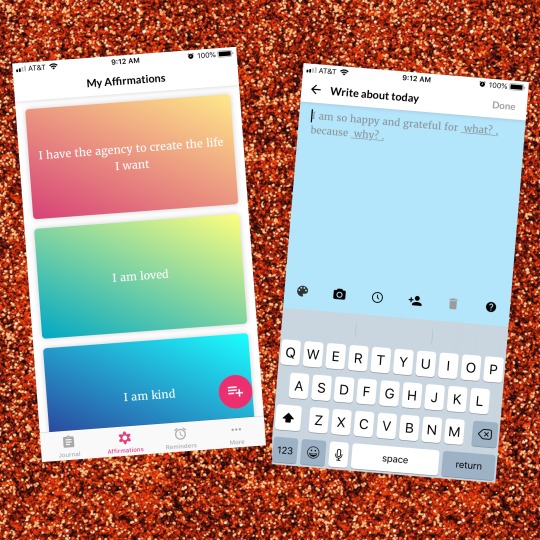
This is a gratitude journal you can write nice things in to look back at the Good. It’s pretty widely accepted that keeping a gratitude journal can improve your mood. This one also lets you create affirmations that can be scheduled to pop up and remind you how great you are.
I hope some of these apps sound useful to y’all! I’m certainly going to be keeping a lot of the ones I downloaded to try out. The next battle is getting myself to actually use them when I need them lol.
3K notes
·
View notes
Text
Anyone else have a hard time taking medication capsules bc they might have microphones inside that will let the government hear your thoughts?
3 notes
·
View notes
Text
Only give reality checks to psychotic people if they ask for it or consent in some other way. If you do it without consent, we will not talk to you about our symptoms again. It is not that difficult of a rule to follow
27 notes
·
View notes
Text
Antipsychotic Drug Treatment
Hello everyone! I know I haven’t posted on this blog in a bit, but i needed to talk about how my treatment for schizophrenia has impacted my life. This is not meant to scare you or to substitute for actual medical advice, but it is meant to educate folks about an experience I am not alone in having. The rest is under a read more because it may get long.
I have been psychotic for most of my life. I remember having hallucinations as young as 5 years old but it was always brushed off as me having a good imagination. These hallucinations weren’t harmful or distressing, but that would soon change. When I was 8, I experienced some trauma that essentially made my psychosis get worse. I started to have delusions that were really distressing and I didn’t know what to do. I hid these symptoms for a long time because I was afraid. When I was 12, I had my first psychotic break. I was actively hallucinating most of the day, every day and I was convinced that what I was seeing and hearing and feeling was real. I was only in the 6th grade. I was so scared of what was happening to me that I told my parents and they were really concerned. I was sleeping on their floor every night and I had to have the lights on. This is also the age where my other mental health issues worsened. At this point, my parents wanted to get me help but I refused. I would not speak to a therapist or anyone else because I was afraid of being hospitalized. That was the worst thing that could ever happen to me in my mind at the time. The psychosis continued to ruin my life. I was cutting myself and having suicidal thoughts everyday. In 8th grade, I finally tried to kill myself. I was 13. I had told my friends what happened and they reported me to the guidance counselor, who called 211 and a crisis counselor came to the school to evaluate me. I lied about pretty much everything because I was scared, but she mandated that I seek counseling anyway. I started seeing a therapist and she recommended that I be evaluated by a psychiatrist. The psychiatrist wanted to medicate me for my depressive symptoms, but my parents did not allow it. They said I was too young to be on that type of medication. About a year later, I stopped getting counseling. But my symptoms were still present. When I was 15, I went back to counseling and this time my parents agreed that I needed to be medicated. I started off with antidepressants of all sorts- nothing helped. Actually, they often made me feel worse. Then I disclosed my psychotic symptoms and issues sleeping and I was put on Seroquel. Only 25mg at the time, but in the next few years that dose would increase to 300mg (which is still low for some people).This medication helped with the psychosis, but it didn’t ever go away. It also made me gain a significant amount of weight and as my dose increased, my cognitive abilities decreased. I was a good student but I quickly found it difficult to read and comprehend written words. I also couldn’t remember anything no matter how hard I tried. It wasn’t just school either, I was forgetting to do things at home too. I would consistently forget to do something my parents asked me to do if I waited more than 5 minutes to do it. I also couldn’t keep track of what time or day it was. Then, I had another psychotic break (even though I was taking my medication) and I ended up being hospitalized. This pattern repeated many times. In the next few years, I would be hospitalized for psychiatric reasons 6 times. When I was 20, I finally was able to come off of the Seroquel. I was inpatient at the time and I told the doctor that I could not keep taking it because it was not helping enough and I was having such severe side effects. I tried a few more antipsychotics, but the only one that worked was Vraylar. I maxed the dose on that pretty quickly but I was still experiencing psychosis daily. The cognitive symptoms that were brought on by the Seroquel never faded. I am now on ADHD medication to help with focus and memory but even that isn’t enough. I am so impaired that my grades in high school and now in college suffer. Even with accommodations, I am unable to learn in the same way my peers can learn. I cannot take my own notes in class, I can’t remember deadlines and material for exams. So far I have only had one professor that was willing to alter tests to make them more manageable for me. Multiple choice and true/false is the only format I can really do without great difficulty. Unfortunately, most of my exams are essay, short answer, or fill in the blank. I struggle to complete work because of the impact that my antipsychotic treatment has had on my brain. When my psychiatrist gives me tests to see how I am doing cognitively, I do not perform well. I can’t sort things into groups that make sense, I can’t spell words backwards (or forwards), I can’t summarize a text. I just can’t do it without assistance. I have to use a screenreader to access reading material for school and I have totally abandoned the idea of reading for pleasure. I even have trouble writing and that is something I have loved since I was little. I am not confident that I will be able to obtain a college degree and get a job in the field I desire. My schizophrenia treatment has harmed me more than it has helped me. It has also harmed my friends and family because they had to see me suffer through these side effects for years. They had to watch me go from a super involved person to someone who isolates because I just can’t function in a neurotypical way. I have trouble getting dressed, taking a shower, feeding my dog- if I can’t do those things, how can I do anything else? And I was never once warned that these antipsychotic drugs could mess with me in such a significant and permanent way. I had to do my own research and bring it to my doctor who agreed that it was a possibility. I don’t think it is a possibility, I know it is a fact. I have suffered serious side effects that will probably never go away all because I wasn’t told it could happen to me and no one believed me when I said what was going on. Again, this isn;t to scare anyone, it is just to tell my story in hopes that you will research medication before taking it. Psychiatric medication can 100%m help and improve symptoms, but for some it comes at a cost. You have to be the one to decide if that cost is worth it for you. Be safe.
#antipsychotics#seroquel#vraylar#pseriouslypsychosis#pseriosulypsychotic#medication m#schizophrenia#mental illness#schizo spills
6 notes
·
View notes
Text
To those whose trauma is worse around the holidays, or has to be around their abuser or around those that stood by while they were abused...
You are valid. I am so sorry it’s like this. It’s not fair. But you will be okay. You’ve survived the trauma. You can survive this, too.
I hope that one day, it’s not like this for you. But for now, remember you’ve survived already and can continue to do so. It’s not fair, but you are strong and I believe in you.
990 notes
·
View notes
Text
My surgery is tomorrow and my mental illness is messing me up real bad
2 notes
·
View notes
Text
Why. Am. I. So. Anxious. Today.
0 notes
Text
Most of the loud, articulate and visible people in the mental illness related communities are people who could, admittedly with outdated terminology, be considered "high functioning."
This makes sense, considering that it takes a certain level of ability and energy to get properly involved in activism of any kind. But here's a reminder not to forget and exclude the rest of us.
Don't forget about the people with cognitive impairments and intellectual disabilities and learning difficulties and don't alienate them by insisting that "just because we're mentally ill doesn't mean we're not intelligent."
Don't forget about the people in institutions like group homes and psych wards and don't alienate them by talking about how "mental illness doesn't mean you have to be locked up in an institution."
Don't forget about the people who are unemployed and/or uneducated and are forced to rely economically on welfare or their loved ones and don't alienate them by saying things like "mental illness should not affect your ability to provide for yourself."
Don't forget about all the people with chronic illnesses and all the people who are treatment resistant and don't alienate them by saying that a full recovery is always inevitable and realistic.
Don't forget about the people who are visibly mentally ill and who can't ever pass as neurotypical and don't alienate them by saying things like "mentally ill people are always just like everyone else."
Every mentally ill person struggles in different ways and I don't mean to invalidate anyone, but I am tired of seeing the more functional people throw less functional people under the bus in the name of activism and reducing stigma.
344 notes
·
View notes
Text
It is okay to use accomodations even if they aren't built for your specific disability. If a screenreader helps you, use it. If audio books are better, listen to them. If you think dyslexia friendly fonts are easier to read, read them. If you need to use a ramp or elevator because stairs are hard for whatever reason, do it. I can't possibly list them all but if an accomodation makes your life easier as a disabled person in whatever way, fucking use it. Gatekeeping accomodations only makes them less "normal" and makes it harder for folks to access.
50 notes
·
View notes
Text
a little reminder, if you have accommodations, use them! addendum to that, if you have accommodations that are considered more ‘drastic’ than others, still use them!
I can’t count the times I’ve had meltdowns/sensory overload in silence when I had the opportunity to leave the room because I felt it wasn’t ‘that bad’. I didn’t need to be /removed/ from the classroom altogether because of some noise…right? Leaving was too drastic! I wouldn’t use what I needed because I felt if I deliberately left the classroom and missed work, I was being lazy, but that’s not true! I would’ve just been doing something that… I was allowed to do! That was it!
if you don’t use some of your more ‘drastic’ accommodations because you think you don’t need them yet, it’ll be embarrassing for people to see how much help you really need, or because you think it’s the easy way out, stop. use your accommodations. that’s why you have them.
358 notes
·
View notes
Text
Study Tips for Chronically Ill Students
Most bloggers aren’t writing for the chronically ill audience. Typical tips, tricks and hacks on productivity, motivation and studying just don’t work for us. As a chronically ill student who’s in her last year of undergrad (yay!) I decided to share what I have learned over the (many) years.
1. Get comfortable. Seriously. Don’t force yourself to sit at your desk, or go out to a coffee shop to study. Most people will tell you not to lay in bed while you read your books but if you are anything like me, getting ready and driving to the library or Starbucks just takes too much energy. I recommend making yourself a nice set up with everything you need. If you can tolerate sitting at a desk don’t skimp out. Buy yourself a decent, ergonomic office or gaming chair. Make sure you have a drink, a snack, your medication, charges, books, and anything else you need within arms reach. The less you have to get up the more energy you are saving.
2. Take frequent breaks. Okay, this may sound contradictory to tip #1 but hear me out. Everyone person is different, every body is different, and every day is different. Some days your symptoms are just so bad you need to get comfortable and try not to move. But other days you might be fighting brain fog and mental exhaustion. So get up, or even just stop and sit for a minute to rest your mind. Some days I will stop every few sections and get up to do something small like apply a face mask, go back to studying, and then get up in 15 minutes to wash it off etc. Just find what works for you.
3. Write shit down. Write everything down. And write it in multiple places. Again, brain fog is such a bitch, but writing things down multiple times in multiple places will help you remember. I have a paper calendar that I write all my assignment due dates, doctors appointments, and other important things onto, but I also have an assignment check list with all of my upcoming assignments in my notebook. Also, I keep a huge running list titled Never Ending List of Shit To Do with boring chores and tasks that need to be done like doctors to call, bills to pay, letters to mail etc; and I use that list to pick and choose what I’m going to do each day and fill that out on a sticky note or another small insert that serves as my daily to do list.
4. Establish a routine. But don’t be discouraged if you can’t follow it to a T and don’t be afraid to change it up. My routine changes a lot because my symptoms and body are constantly changing too. Also, it’s important to note that a routine is not the same as a schedule. This is important for those of us with chronic illness because its just not feasible to assume we will be able to get up at the same time every day, eat lunch at the same time every day, and study for the same amount of time every day.
5. Stay (way) ahead of schedule. You never know what life is going to throw at you, especially when you are chronically ill. Unfortunately, we can’t plan our flares, but we can prepare for them. If you know you suffer from migraines that will knock you out of commission for 3 days then make sure you are always 3 days ahead of schedule. Something I highly recommend is doing a little bit every day, even if its only 20 minutes of reading. Of course, sometimes we need a break and that’s okay too! Self care is important!
6. Online classes are the best. So many people say online classes are hard because you have to be super disciplined, and that it’s easier to have the accountability to show up to class, but I highly disagree. Online classes give you the freedom to read when you want, listen to lectures when you want, sleep when you need to, and stay comfortable in bed when it would be impossible to get to class. I work solely online and if it weren’t for the option of online classes I would not be in college right now or anytime in the near future.
7. Audio is your friend. Honestly, this is a tip for everyone in high school or college out there. Sometimes we are too tired or in too much pain to stare at a book or screen, or sometimes we need to utilize our energy wisely and multitask by listening while we clean the house. And this isn’t limited to audio text books. There are so many YouTube videos, podcasts, documentaries and more that you can easily just pop on while you are resting or doing chores! I listen to my lectures while I do my nails every week.
8. Don’t rewrite your notes. Don’t write them at all if you can avoid it. Almost all of my professors supply chapter outlines or summaries that I can just print off and fill in extra notes on. If you do need to write your notes I suggest typing them, or only writing them out once, and only what is most important. Whatever you do, don’t rewrite them, and for the love of god do not waste your time trying to make them look like an Instagram photo. Ain’t nobody got spoons for that.
9. Try to balance your course load appropriately. If you are taking a full course load try to even out the number of upper division classes you take with some easy classes, as well as some boring and some interesting. Alternatively, don’t be afraid to drop classes and go down to part time, even if just for one semester. I have tried to stay full time all year round since I re-enrolled in school fall semester of 2017, but spring of 2019 my health took a drastic decline and I did drop down from 5 classes to 3. I also took summer of 2019 off to focus on my health and came back this semester (fall 2019) ready to rock and roll. Seriously, do not be afraid to drop classes. It felt like the end of the world when I did it, but it was absolutely the right choice for me. It saved my GPA and my sanity.
10. Talk to your professor. And your university, and your classmates, and your adviser, and anyone else around you who can offer resources and support. Every university and college has a Disability Services Coordinator Student Center available to request accommodations. The information to contact the center should be listed on your syllabus and the school website. They can help with everything and anything disability related. And if you feel comfortable you should really talk to your professor. Just give them a heads up and inform them of what’s going on. As for your classmates, its always good to connect and find a study buddy or someone you can borrow notes from whether you have a disability or not!
I really hope this list can help some fellow chronically ill students out there. This is what I have learned in my 5+ years of attending college with various chronic and mental illnesses. I truly live by everything I talked about in this post and I have been fairly successful in my academic career. Please re-blog this post to help a fellow student who may have a chronic illness or disability! Happy studying!
5K notes
·
View notes
Text
some asshole: taking psych meds is too dangerous! it will change the way your brain works and you won’t act the same!
me, gesturing grandly at my collection of chemical imbalances and destructive coping mechanisms:

10K notes
·
View notes
Text
#tpfw people think your mental illness is “compelling” or “interesting”
18 notes
·
View notes
